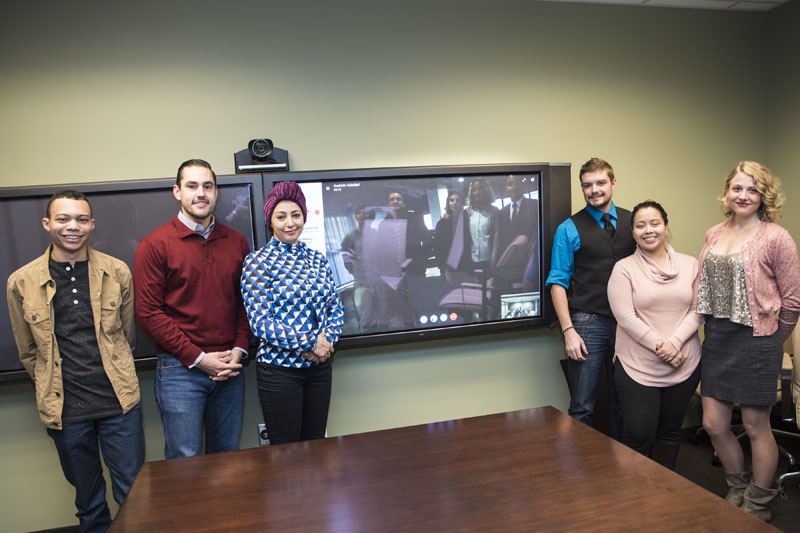
S-CAR students in Arlington converse with students in Kosovo for a project targeting extremism. Photo by Ron Aira.
When the project began, the American students were not certain how the students in Kosovo—the highest per-capita supplier of ISIS fighters in Europe—would respond. After all, the Americans were asking for honest answers as to how violent Muslim extremism had impacted their lives.
It was a brave dialogue on both sides of the ocean via Skype between six master’s students from George Mason University’s School for Conflict Analysis and Resolution in Arlington, Va., and 40 students from Kosovo’s Kolegji Universum.
The semester-long project “has been one of the most rewarding experiences of my academic career,” said Eric Grenlin, one of the Mason students and a retired Army staff sergeant. “These students want their voices heard, and they have many of the same concerns, both local and global, as young people in America.”
“I've learned that simply being heard among our peers at home and abroad is a powerful feeling,” added Mason’s Chris Blakely Jr. “These talks could be a preventative measure to violent extremism and a way to prepare millennials across the globe for other social challenges on the horizon.”
The project called “Peer to Peer: Challenging Extremism” was sponsored by the Department of Homeland Security, Facebook and EdVenture Partners.
The Mason students developed a two-pronged social media engagement strategy that also involved a cohort of conflict undergraduates at Mason’s Fairfax Campus addressing a domestic audience.
The night before the Kosovo presentation, 25 Mason students held a two-hour “tweet-in” in which they direct messaged U.S.-based Twitter accounts whose tweets contained hashtags that suggest Islamophobia or violent aggression toward Muslims. Mason senior Rachel Agnello, who helped organize the event, said most of the messages sent to the hashtags were designed to be comical or shocking, in an effort to counteract the root of Islamophobia: fear.
The following morning, the Mason students in Arlington heard essays from their Kosovo counterparts about how Muslims in Kosovo and around the world have been stereotyped, and how those few who have been drawn to extremist violence need to be addressed.
“Only through conversation and understanding can we truly address the issue of violent extremism,” said Grenlin. “The success of this event has empowered me to continue on my journey to make the world a better place for us and for future generations.”
